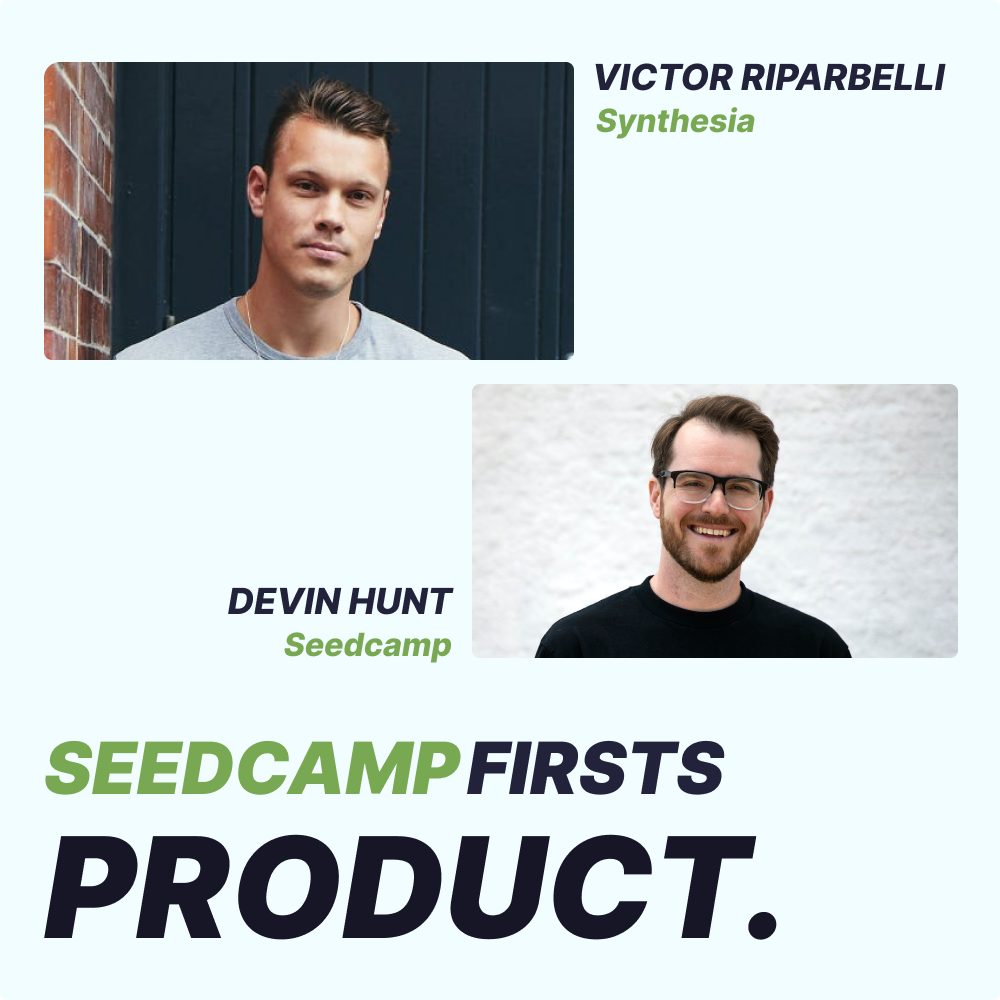In our latest Seedcamp Firsts edition, Victor Riparbelli, co-founder of our portfolio company, Synthesia, speaks with our Venture Partner, Devin Hunt, about making big bets, how to get comfortable with long-term product decisions, and learning from mistakes.
“Our mission as a company is to enable anyone to make a Hollywood film on their laptop with just a login and their imagination. So there’s obviously still some way from where we are today until we get there.” – Victor Riparbelli
Founded in 2017, Synthesia is the world’s largest AI video platform. Using anthropomorphic AI avatars, the company helps people make video content without the need for cameras, studios, actors, and any other physical recording process.
“When we started the company, we took a bet that AI was going to rapidly advance over the coming decade and that something like this would actually be possible five years ago. It definitely felt like a crazy bet!” – Victor Riparbelli
When it first got started, Synthesia went against conventional startup advice, starting from a technology perspective, not a problem:
“We started from a technology in the sense that our thesis from the beginning was: we are going to build technology that will replace any form of physical recording.” – Victor Riparbelli
The team tried to break down the problem of video production from first principles. While the R&D team was working on this first iteration of the product – a dubbing product that could change the speech in a video, usually to a different language – Victor and his other commercial co-founder, Steffen, spoke with potential customers to deeply understand the pains of video production.
Seeing how receptive prospective users were about this nascent technology, they continued by breaking down video production and then trying to reassemble that and map it to an AI maturity curve.
“The whole thesis around this, and I think in general what that’s what makes Deep Tech startup special, is that the capabilities of the technology are rapidly evolving (…).” – Victor Riparbelli
Given the slow iteration cycles for AI technologies, you have to make some big bets when you think about product, highlights Victor.
“In the traditional startup culture, it’s all about just like moving fast. Lots of big experimentation. Just build something, see if it works, see if it sticks. And the certain element of that, of course, also in AI. But in AI, it’s actually okay to sit down and plan a little bit more carefully. It’s okay to spend a bit of time trying to think out the potential scenarios, do we think this will actually work?” – Victor Riparbelli
An important factor in the evolution of Synthesia was the monetization of its first, very basic product. Having long sales cycles, the product was clearly unscalable. However, this strategy helped the team build a huge network, better understand the markets they were targeting, and iterate the product in a more efficient way.
Listen to the full conversation on your favourite platform or watch it on YouTube.
Try out the studio at synthesia.io.
If you’re short on time, we’ve pulled some key learnings for you below.
Key Takeaways
- The early days are about survival and getting to product-market fit. As the company grows, you can take bigger bets.
- Think about new markets as opposed to an incremental solution in an existing market.
- If you are an AI startup, plan and think out the potential scenarios before starting to code.
- Diversity of skills in the founding team is essential, especially in DeepTech startups.
- Sell to customers even if the product is not perfect, and be in contact with the “real world.” This helps you to get confidence in who is excited about the technology and where you need to put the resources towards.
- Offering an end-to-end solution gives you more control and helps you iterate faster.
- Measure success by usage, revenue, and happy customers.
- As AI technology evolves and democratises, you need to always stay ahead of the game. However, as an AI startup, it’s important to manage your relationship with trends (e.g., Web3, generative AI, etc.). While those trends can help you amplify your message and give you a lot of attention, they can detract you from building what is important and provides value to customers.
Check out our growing Seedcamp Firsts Content Library.
